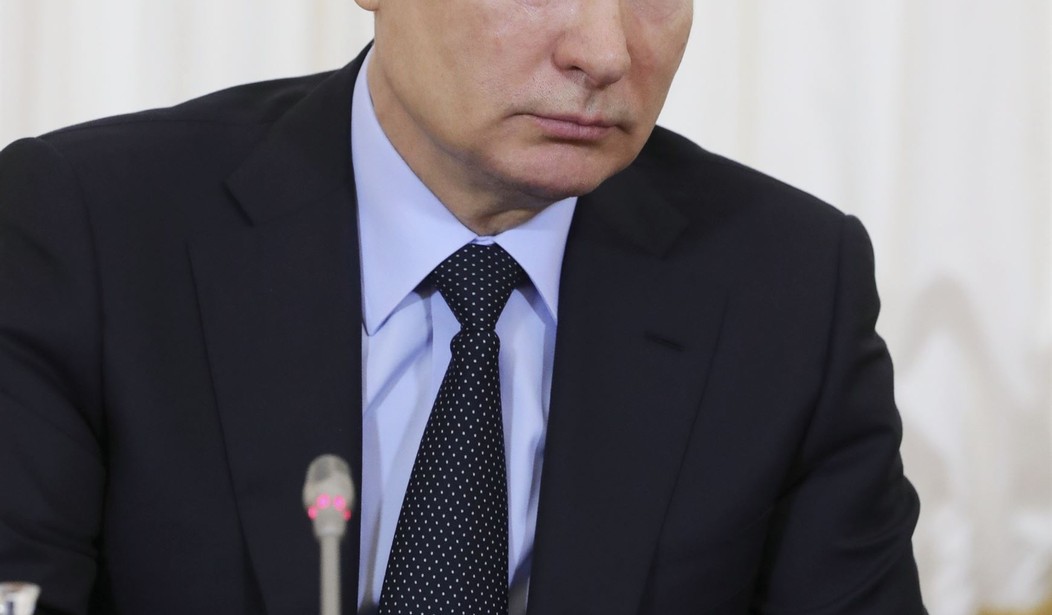During the 2012 presidential campaign, Mitt Romney argued that Vladimir Putin's Russia is America's chief geopolitical foe. In a now-embarrassing display of sanctimony and arrogance, President Barack Obama dismissed Romney as a benighted Cold War revivalist. "The 1980s are now calling and want their foreign policy back," Obama sneered.
Subsequent history has proved Romney to be correct and Obama dismally wrong. Russia's 2014 invasion and annexation of Crimea and its creeping war of aggression in Ukraine are two very dangerous examples of war-making by the Kremlin that challenges American security and American allies.
Russia's war in Ukraine targets Ukraine, but NATO is the deeper target. The Kremlin's incessant anti-NATO propaganda narrative attests to that.
For some 15 months, Russian "meddling" in the 2016 U.S. presidential election has been a constant subject of mainstream media outrage, speculation and conspiracy mongering. Late last week, Special Prosecutor Robert Mueller indicted 13 Russian nationals and three Russian companies on charges of conspiracy charges and -- get this -- identity theft. Basically, the 13 individuals and three companies were involved in a Russian agitation-propaganda campaign to seed discord in America. The operatives relied on social media platforms, internet hysteria and willing media dupes.
However, Kremlin agitprop and disruption operations in America are not a new phenomenon. Kremlin-backed covert influence operations against the U.S. date back to at least 1919. There was evidence Bolshevik Russia had ties to radical labor and anarchist movements.
For over eight decades, the Kremlin has used politically divisive and demonstrably false news media reports to forward covert influence operations. New York Times reporter Walter Duranty won the 1932 Pulitzer Prize for his 1931 coverage of the USSR, even though his reporting was fake news and false narrative of the worst stripe. Duranty denied that Soviet dictator Josef Stalin's forced agricultural collectivization program had killed millions. In November 1931 he denied that there was a famine or any "actual starvation" in the USSR. But there was a genocidal famine. All told, Bolshevik evil and famine killed from 2.5 to 10 million people.
Recommended
Duranty also knew he was lying. In 1932, he admitted it to a British Embassy official in Moscow. Yes, a willing media dupe with a New York Times byline.
Leftists and Communists in the U.S. used Duranty's fake news to defend Stalin's regime and dismiss critics of the USSR as evil, backward capitalists using "Red scare" tactics. They didn't quite foreshadow Obama with an "1880s are now calling" quip, but came close to it.
Since 2012, emerging evidence suggests that China has become as formidable an American foe as Russia. China uses similar disruptive information warfare techniques. According the "Worldwide Threat Assessment of the U.S. Intelligence Community" released last week by the Director of National Intelligence, China is particularly adept at using cyber weapons.
Last week, the journal "Defense and Security Analysis" published another document analyzing Russian covert influence and subversion operations. Titled "The subversion of the Bulgarian defence system -- the Russian way," and written by Mihail Naydenov, the report analyzes the economic, political and information tools and techniques "used by Russia in its hybrid war against Bulgaria."
You didn't know Russia is attacking Bulgaria? "Hybrid war is not declared." Naydenov writes. "Instead, it is being fought."
The Kremlin's goal is "state capture," which he defines as "a de facto loss of control over policy direction" that ultimately limits or denies Bulgaria the ability "to take independent national decisions..."
Another Kremlin objective is "fuelling division" among NATO members. False narrative, spun by both Russian operatives and local proxies, is a key technique. With the goal of shaping Bulgarian public perceptions, the Kremlin relentlessly insists that NATO is preparing to attack Russia and is militarizing the Black Sea.
Dividing NATO harms U.S. security interests and opens the whole of Eastern Europe to Russian domination.

























Join the conversation as a VIP Member